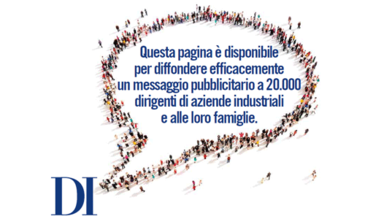The challenges of "gender equality": the concrete proposals for Italy from some executive women managers in the world!
Diversity is one of the most popular topics at the moment. In fact, Federmanager also recently reserved several very interesting webinars and round tables on the subject.

Sara Cattaneo
Global Procurement Manager ABB - ALDAI-Federmanager's member and member of the editorial committee
But why is it being talked about so much right now?
Probably because, despite being a very topical issue for some years already, unfortunately the pandemic has further highlighted the critical issues related to female work, usually set in a family context that is complex to manage for any type of female worker. In addition, many concerns have been generated around the employment statistics relating to the unfortunate year 2020: according to Istat the phenomenon of job-loss has affected women above all (we are talking about fixed-term contracts, part-time contracts, self-employment, etc.).
Let's take a more specific look at the situation of female executives in Italy: according to an INPS analysis in this regard, in 2018, only 18% of private sector executives in Italy are women. This whole situation has therefore brought strong attention to the issue and to such an extent that it has driven discussions around the funds destined for gender equality, also regarding the Recovery Fund. So let's not waste this opportunity!! And let’s try and identify concrete solutions that can improve the situation of Italian Women Managers; I asked some female executive managers in multinational corporations, residing in other countries, for their opinions. They can turn into food for thought and Italy could draw inspiration from them.
Angela Qu (Chief Procurement Officer Lufthansa Group)

Angela is a Senior Vice President, who developed her cultural and professional background between China and Europe, and now resides in Germany. In the past she was the promoter of programs aimed at developing female talent in multinational environments.
Countries in comparison
Angela told me that the Chinese culture is based on a totally equal vision between man and woman, as “both hold up Heaven above us equally”. This culture practically results in the support the government/companies give to working women in the form of care-systems, i.e. infrastructures / kindergartens directly created within the working environment, designed to help women reconcile the various aspects of their lives. The culture that she has found in Europe is totally different, even in Germany, the country led by a female leader for years, and which despite that seems to position itself not too well in the European rankings linked to the Diversity theme. Germany still seems to have a long way to go with regards to the development of female work and is taking the first steps in the right direction right now. An example can be seen in the introduction of regulations at the end of 2020 that require listed companies to have at least 30% of women within executive committees (a rule similar to the “famous Italian female-quotas”) or through the massive adoption of smart-working, which the pandemic has accustomed us so much to, allowing for greater flexibility.
Prejudices and cultural change
Angela is also convinced that an important role is still played by stereotypes. Men, who still undeniably represent the majority of the ruling class, often tend to look for characteristics similar to their own in collaborators ... therefore women with a style that is too "nice” risk being underestimated, while on the other hand those ones emphasizing their own leadership, behaving a little outside the box and not complying with typically feminine patterns, risk perceived as "aggressive" and almost "unpleasant". Companies therefore must promote a cultural change, aimed at accepting the attitudinal differences of men and women - they can complement each other and represent an added value. Furthermore, when selecting personnel, she suggests always taking into consideration the fact that women often tend to less self-promoting about their achievements. They seem less ambitious for a career advancement and are almost urged to talk about it. On the other hand, men, so determined and apparently aware, often tend to present themselves well and they are not afraid to apply for a job which they can grow with. These dynamics, if not considered, can therefore be very misleading in selecting the right candidate.
Corporate executive presence programs
Angela was the pioneer promoter of the launch of development programs for Female Talent within some multinational corporations, aimed at creating the cultural change we mentioned earlier, but also at strengthening leadership skills and female executive presence. It often happens that high-potential professionals lack a bit of self-confidence due to the most varied reasons, character or culture and environment in which they grew up, and that unfortunately ends up weakening their communicative effectiveness. These programs are aimed precisely at strengthening one's self-confidence and one's image; she told me about some examples of women who participated and benefited greatly.
According to Angela women do not need to be taught how to grow on their own path (as long as they know what they want to achieve), but they only need to be provided with the right means to shine at their best!
Angela's advice? "Be clear about what you want to achieve in life, be bold and be yourself!"
Teresa Hitchings (Executive Operations Leader- Eastern Europe & ROW – ELSB ABB)

Teresa has held various executive roles in major multinational corporations and in areas usually managed by men such as operations and manufacturing; she is of British origin, and today she resides in Budapest.
Countries in comparison
Looking at the statistics again, the UK seems well positioned on equal opportunities. I asked Teresa how she thought the UK had differentiated itself from other European countries; she told me that the situation in reality was not so rosy when she started her career during the 90s. It is also true that precisely in that period (between the 90s and 2000s), Great Britain began to place a great emphasis on the role of women also in the Operations and Technology sectors, by promoting gender difference among companies as an important value. This constructive comparison could give some food for thought and new useful projects aimed at the development of the business itself. On the other hand, the UK has conducted in an exemplary way a campaign of cultural change also directly in schools, addressed to young women, through the promotion of the technical degrees (eg: Engineering) and developing an open mind to push the growth of women in managerial positions.
Women in support of women
Teresa strongly believes in the fact that no one better than women managers can be a valid promoter of the battle for gender equality and can support the development and professional growth of other women. They can actually recognize their potential and talent more than anyone else. That absolutely does not mean favoring women "regardless", or that they deserve a role in virtue of mere diversity, but it means that we must fight for equal opportunities, for at least an objective evaluation during a selection process.
Teresa's advice? "Believe more in yourself, and have the courage to make your voice heard!"
Isabel deMars (Global Sourcing Process Excelllence Leader)

Isabel has held various global roles in various American and European multinational corporations; she resides in South Carolina (USA)
Countries in comparison
According to an analysis by GlobeWomen Research in the United States, over 28% of women are on the boards of directors of listed companies; what is very meaningful is that this result seems to derive from an organic path, without the introduction of specific rules for female-quotas in executive committees (which could represent the next step for a further development). Isabel told me that the statistics show a US job market that is now very female, even in areas and roles typically dominated by men in the past. The path towards a cultural change that the USA started years ago is therefore very clear: building a social fabric that is increasingly open to equal opportunities (just think of the new female Vice-President). I myself have met American women managers and new mothers, who returned to work after giving birth, entrusting the management of her baby to her husband, without causing too much dismay among friends and relatives; on the other hand, let me mention how the changing table for babies can be found in the men's public baths of many American States. In addition, regulations have been introduced to support various minority categories in many States (for example, incentives to achieve minimum business quotas with companies owned by women) and to support equal wages.
Development points
Isabel also returns to the issue of self-confidence, which women seem to have to improve in many cases, as well as of the ability to accept their mistakes, in order to draw and learn valuable lessons, without undermining their self-esteem too much. And same as Angela she believes that everyone must recognize and take advantage of the peculiarities of her own leadership style, without necessarily having to align with the male model, which is based on completely different characteristics and attitudes.
Isabel's advice? "Stay true to your values!"
In summary, the main challenges facing women managers seem to be:
- family duties
- prejudicies
- lack of self-confidence/self-branding
And the main solutions identified:
- Targeted welfare policies (adequate infrastructure, kindergartens in the workplace, subsidies for external aid, etc.);
- Government regulations that impose female- quotas at multiple levels, and encourage hiring and collaboration with women;
- Flexibility (smart working, digitization) and evaluation based on the achievement of objectives;
- Communication campaigns aimed at a cultural change both in companies (to promote the value of diversity) and at schools (to encourage young women to pursue technical degrees and managerial paths);
- Female development programs within companies (e.g. executive presence);
- Women in support of women: women must represent the first supporters of their categories.
Regardless of your country of origin, your cultural background, your life priorities... the common goal of women managers is not to push all women towards a career choice rather than a family choice or any other kind, but simply to ensure that all women have the choice.
01 marzo 2021
 Localizza
Localizza 




 Stampa
Stampa
 WhatsApp
WhatsApp














